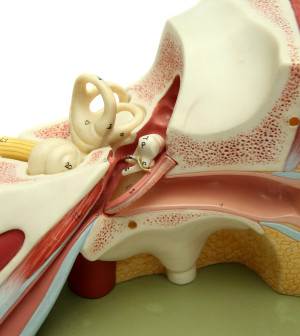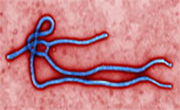- Could Your Grocery Store Meat Be Causing Recurring UTIs?
- Are You Making This Expensive Thermostat Error This Winter?
- Recognizing the Signs of Hypothyroidism
- 10 Strategies to Overcome Insomnia
- Could Artificial Sweeteners Be Aging the Brain Faster?
- Techniques for Soothing Your Nervous System
- Does the Water in Your House Smell Funny? Here’s Why
- Can a Daily Dose of Apple Cider Vinegar Actually Aid Weight Loss?
- 6 Health Beverages That Can Actually Spike Your Blood Sugar
- Treatment Options for Social Anxiety Disorder
Inhaled Ebola Vaccine Protects Monkeys


The quest for an effective vaccine against Ebola has moved a step closer to reality, with a new study finding an inhaled version worked well in monkeys.
Researchers say the experimental vaccine provided long-term protection.
“There is a desperate need for a vaccine that not only prevents the continued transmission from person to person, but also aids in controlling future incidences,” study co-author Kristina Jonsson-Schmunk, a graduate student at the University of Texas at Austin’s College of Pharmacy, said in a university news release.
“The main advantage of our vaccine platform over the others in clinical testing is the long-lasting protection after a single inhaled dose,” study co-author Maria Croyle, a professor in the College of Pharmacy, added in the news release.
The ongoing Ebola outbreak in West Africa has so far topped more than 13,500 cases, with almost 5,000 deaths reported, the U.S. Centers for Disease Control and Prevention. Currently, there are no licensed vaccines or treatments for Ebola.
According to the researchers, an inhaled vaccine could overcome difficulties that would be associated with storing, transporting and giving injectable vaccines to people in the regions hardest hit by Ebola.
Currently, a pair of promising Ebola vaccines are poised to be deployed in West Africa by January, experts have said. However, both are given by injection.
The rival American and Canadian vaccines still have to pass expedited human safety trials in the United States, manufacturers have said. Results on those safety trials are expected in December.
In this latest study, survival was 100 percent among the monkeys who were infected with Ebola 150 days after receiving the inhaled vaccine, the Texas team said. The survival rate among animals given an injected version of the vaccine was only 50 percent.
The findings were published online Nov. 1 in the journal Molecular Pharmaceutics, and were to be presented this week in San Diego at the annual meeting of the American Association of Pharmaceutical Scientists.
According to the research team, this is the first study to show that a single dose of non-injectable vaccine for Ebola is long-lasting.
The next step in this research is to test the inhaled vaccine in people, the team said.
More information
Find out more about Ebola at the CDC .
Source: HealthDay
Copyright © 2026 HealthDay. All rights reserved.










